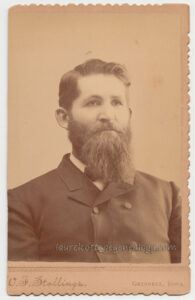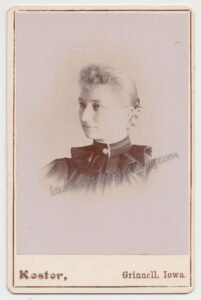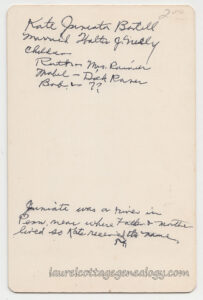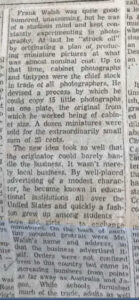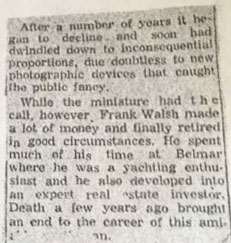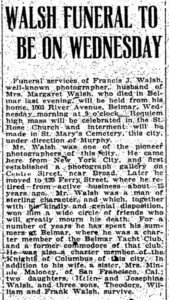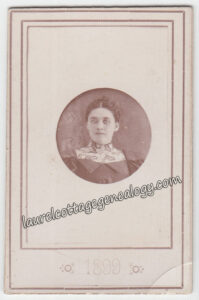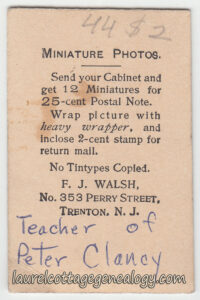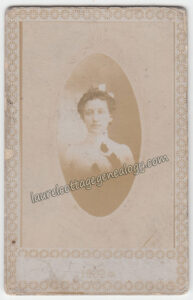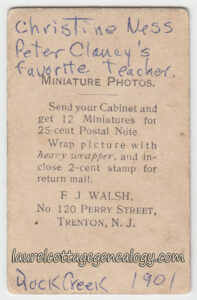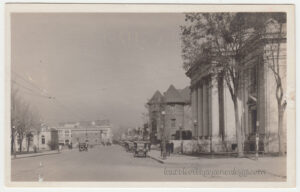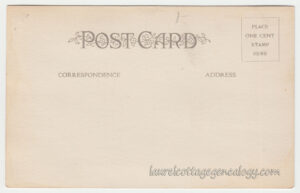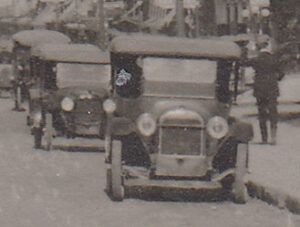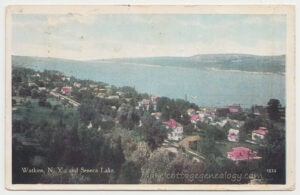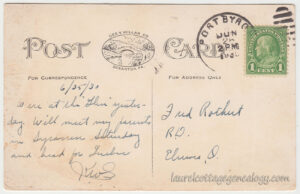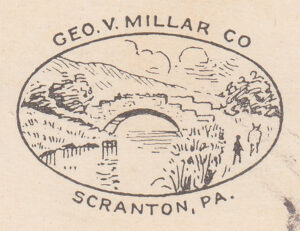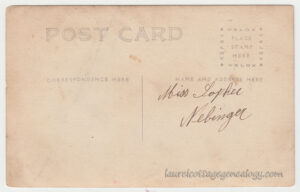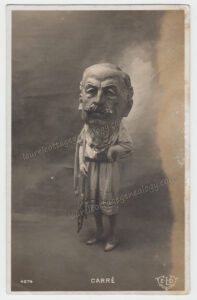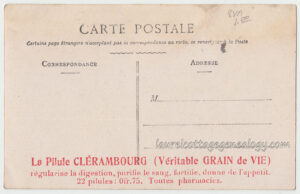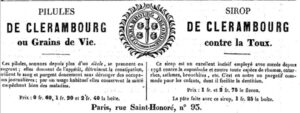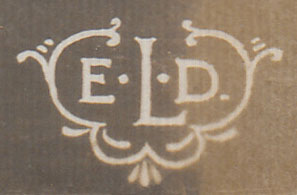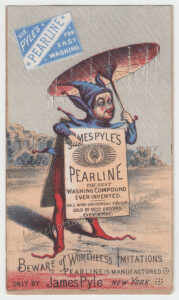
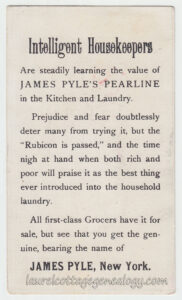
Trade card, New York. Circa 1880s – 1890s.
Price: $7.00 Size: 3 x 5 and 1/8″
Trade card for the washing powder, Pearline (James Pyle’s Pearline, later James Pyle & Sons).
Note: I’ve said this kind of thing before, but for successful companies, it’s not possible to do total justice in a fairly short blog post. Once you start researching, you keep finding more and more, leading to more questions you’d like to get a pinpoint answer to. It becomes very time-consuming, and you have to cut yourself off at some point. Other bloggers crop up, too, who’ve put up great stuff on the subject. On this one, I went looking, last minute, for potential company records. Didn’t find those but did find a Pyle family descendant who did an excellent post. Lot of info there. But I’ll slog on and finish my humble offering here – kind of bits and pieces….
This one was supposed to go up the day after Halloween and here it is nearly April. (Ee gads!) Lots going on, including the addition of our beautiful new kitty and pup. (RV life with young animals – wild, wild.) I also changed the look of the website (just needed a change). In any case, getting back to it…..
Intelligent Housekeepers
A court jester, well away from “court,” stands out in the rain with parasol and sandwich board to advertise James Pyle’s Pearline – a soap powder for laundry, kitchen use and just about anything else – from the cleaning of oil paintings to commercial use in dairies to bathing in fresh or salt water. (Salt water bathing – a definite testament to a bygone era.) The company became hugely successful, with the soap product becoming a household name.
Early years
Founder, James Pyle, (1823 – 1900) was born in Manchester, Nova Scotia, Canada, coming to New York in the 1840s. On the 1860 Federal Census, he had given his occupation as “salaeratus manufacturer,” (sodium bicarbonate). An obituary for him states he first starting making a liquid cleaner, then “sodas and soaps.” By 1861, we see newspaper ads appearing for “Pyle’s O. K. Soap,” an earlier offering that, according to author, Allan Metcalf (OK – The Improbable Story of America’s Greatest Word) was later sold to Procter & Gamble. (I didn’t find whether there was any overlap of the two products being manufactured at the same time, by Pyle, or if the one just replaced the other.) Sons, James Tolman Pyle and William Scott Pyle came into the business with him when they became old enough. The 1880 Federal Census shows father and sons as soap manufacturers. Another son, Charles, had died before the 1880 census was taken.
A March 1877 ad for both Pyle’s O. K. Soap and Pyle’s O. K. Saleratus:
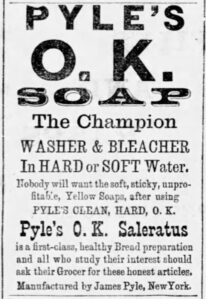
Pearline trademark from an 1885 ad – the “O.K.” references the company’s origins:
Pyle’s New York Times obit reported that he was the first to use the term, “o.k.” in advertising, and helped popularize it.
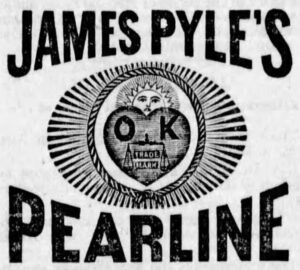
The Power of Advertising
Multiple obits for James Pyle state that he was a friend of Horace Greeley, the founder and editor of the New York Tribune, and that it was Greeley’s generous (quite canny, really) offer, along with, of course, the apparent results, that got Pyle on the road to becoming one of the biggest advertisers in the U. S. In 1904, their ad budget was reported at $500,000. (Greeley’s influence is also recounted in the notice of sale to P&G in 1914.)
1878 – an early Pearline ad
The exact year for the start of the manufacture of Pearline was not located but in October of 1878 there was this ad for “Something New.” (The Patriot-News, Harrisburg, PA, October 11, 1878):
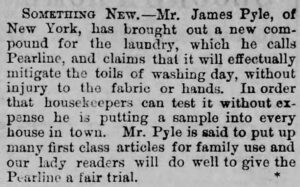
Below, two examples from 1888 that appeared in the magazine, Wide Awake:

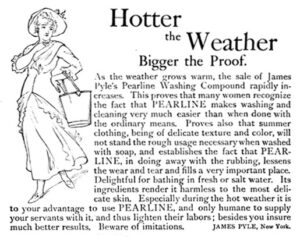
Not being limited to paper and ink….
A Google search result for images of old Pearline ads on buildings:

We’d rather be called chumps and idiots….
In 1897, son, James T. Pyle gives his views to the publication, Printer’s Ink, on not wanting to give away all the company’s hard-earned strategies. The title of this article is one you have to try to think through:
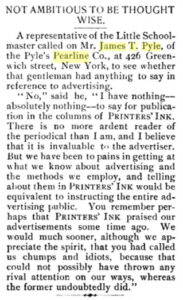
Death of founder, James Pyle, 1900, reprinted from the New York News, in the ad journal Printer’s Ink:
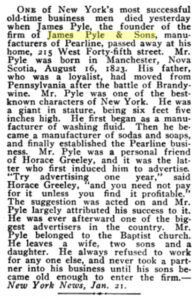
Death of William S. Pyle, 1906. His obit and photo appear in the publication, Profitable Advertising’s March edition.
James T. Pyle’s obituary, 1912, from The Morris County Chronicle:
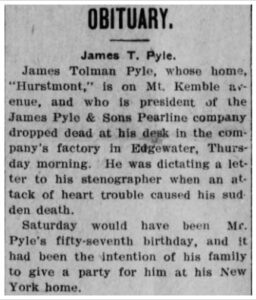
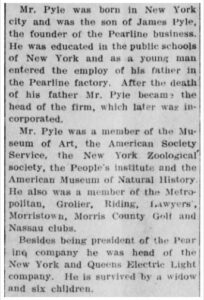
What happened to Pearline?
Cautionary tales (don’t stop advertising!) reported in newspaper articles (some years later), blame either the owner or the trustees for stopping their ads – the idea was that Pearline was already a household name, and they didn’t need to keep spending all that money. Most reports state advertising was stopped in 1907. Was there more to the story? Likely. (It’s never simplistic.) There was a stock market crash in October of that year, which must have definitely had an effect. And really, I can’t imagine James T. Pyle dropping the strategy that had worked so well all of those years, without good cause. Then too, perhaps it was only meant to be a temporary measure. Below, possibly part of the puzzle, a clip from The Morning Call, January 1907 – when the company had taken out a loan on their new New Jersey plant:
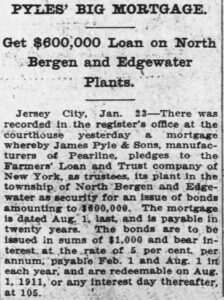

October 1, 1914 – Procter & Gamble Buys Pearline
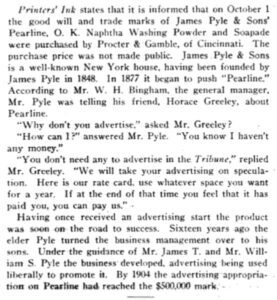
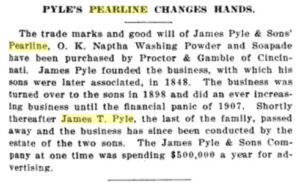
Sources: Handler, E. (2011, July 4). “Occupations of my ancestors – James Pyle & Sons.” From Maine to Kentucky. (accessed March 28, 2025).
Gutek, Gerald & Patricia. America’s Early Montessorians: Anne George, Margaret Naumburg, Helen Parkhurst and Adelia Pyle. Palgrave MacMillan, 2020.
The National Archives in Washington D.C.; Record Group: Records of the Bureau of the Census; Record Group Number: 29; Series Number: M653; Residence Date: 1860; Home in 1860: New York Ward 5 District 1, New York, New York; Roll: M653_790; Page: 385; Family History Library Film: 803790.
Metcalf, Allan. (2011). OK: The Improbable Story of America’s Greatest Word. Oxford University Press. (books.google.com).
Year: 1880; Census Place: New York City, New York, New York; Roll: 884; Page: 234b; Enumeration District: 353.
“Pyle’s O. K. Soap – the Champion.” The Morning Democrat (Davenport, Iowa), March 10, 1877. Saturday, p. 3. (Newspapers.com).
“Death of James Pyle.” The New York Times, January 21, 1900. Sunday, p. 3. (Newspapers.com).
Pearline trademark. The Montreal Star, January 9, 1885. Friday, p. 1. (Newspapers.com).
Horace Greeley. n.d. https://en.wikipedia.org/wiki/Horace_Greeley (March 18, 2025).
“Something New.” The Patriot-News (Harrisburg, PA). October 11, 1878. Friday, p. 4. (Newspapers.com).
Wide Awake, Vol. AA. D. Lothrop Company, Boston. 1888. (books.google.com).
“images of old pearline ads on buildings.” Google.com search, March 18, 2025.
“Not Ambitous To Be Thought Wise.” Printers’ Ink, Vol. XXI. October 6, 1897 – December 29, 1897. George P. Rowell & Co., Publishers. (books.google.com).
Death of founder, James Pyle. Printers’ Ink, Vol. XXX. January 31, 1900, p. 18. (books.google.com).
“Obituaries – William Scott Pyle.” Profitable Advertising, Vol. XV, No. 10.. March 1906. (books.google.com).
“Obituary. James T. Pyle.” The Morris County Chronicle (Morristown, New Jersey), February 13, 1912. Tuesday, p. 1. (Newspapers.com).
“Pyles’ Big Mortgage.” The Morning Call (Paterson, New Jersey). January 24, 1907. Thursday, p. 5. (Newspapers.com).
Sale of Pearline. The American Perfumer and Essential Oil Review, Vol. IX, no. 8. October 1914. New York. p. 221. (books.google.com).
“Pyle’s Pearline Changes Hands.” The Retail Grocers Advocate, Vol. 19. July 3, 1914. San Francisco, California. (books.google.com).

